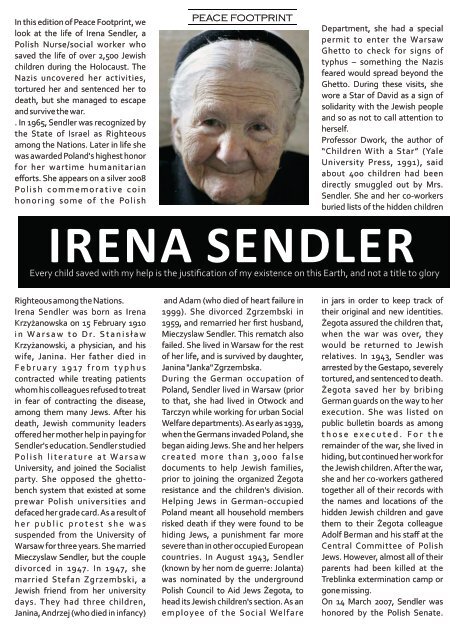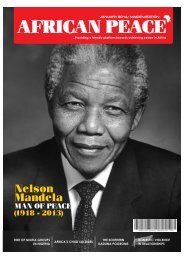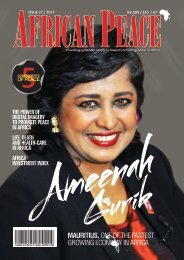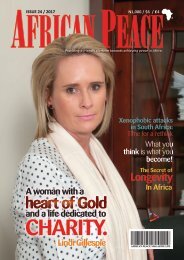Create successful ePaper yourself
Turn your PDF publications into a flip-book with our unique Google optimized e-Paper software.
In this edition of Peace Footprint, we<br />
look at the life of Irena Sendler, a<br />
Polish Nurse/social worker who<br />
saved the life of over 2,500 Jewish<br />
children during the Holocaust. The<br />
Nazis uncovered her activities,<br />
tortured her and sentenced her to<br />
death, but she managed to escape<br />
and survive the war.<br />
. In 1965, Sendler was recognized by<br />
the State of Israel as Righteous<br />
among the Nations. Later in life she<br />
was awarded Poland's highest honor<br />
for her wartime humanitarian<br />
efforts. She appears on a silver 2008<br />
Po l i s h c o m m e m o r a t i v e c o i n<br />
h o n o r i n g s o m e o f t h e Po l i s h<br />
<strong>PEACE</strong> FOOTPRINT<br />
Department, she had a special<br />
permit to enter the Warsaw<br />
Ghetto to check for signs of<br />
typhus – something the Nazis<br />
feared would spread beyond the<br />
Ghetto. During these visits, she<br />
wore a Star of David as a sign of<br />
solidarity with the Jewish people<br />
and so as not to call attention to<br />
herself.<br />
Professor Dwork, the author of<br />
“Children With a Star” (Yale<br />
University Press, 1991), said<br />
about 400 children had been<br />
directly smuggled out by Mrs.<br />
Sendler. She and her co‐workers<br />
buried lists of the hidden children<br />
IRENA SENDLER<br />
Every child saved with my help is the justification of my existence on this Earth, and not a title to glory<br />
Righteous among the Nations.<br />
Irena Sendler was born as Irena<br />
Krzyżanowska on 15 February 1910<br />
i n W a r s a w t o D r. S t a n i s ł a w<br />
Krzyżanowski, a physician, and his<br />
wife, Janina. Her father died in<br />
F e b r u a r y 1 9 1 7 f r o m t y p h u s<br />
contracted while treating patients<br />
whom his colleagues refused to treat<br />
in fear of contracting the disease,<br />
among them many Jews. After his<br />
death, Jewish community leaders<br />
offered her mother help in paying for<br />
Sendler's education. Sendler studied<br />
Po l i s h l i t e r a t u r e a t W a r s a w<br />
University, and joined the Socialist<br />
party. She opposed the ghettobench<br />
system that existed at some<br />
prewar Polish universities and<br />
defaced her grade card. As a result of<br />
h e r p u b l i c p r o t e s t s h e w a s<br />
suspended from the University of<br />
Warsaw for three years. She married<br />
Mieczyslaw Sendler, but the couple<br />
divorced in 1947. In 1947, she<br />
married Stefan Zgrzembski, a<br />
Jewish friend from her university<br />
days. They had three children,<br />
Janina, Andrzej (who died in infancy)<br />
and Adam (who died of heart failure in<br />
1999). She divorced Zgrzembski in<br />
1959, and remarried her first husband,<br />
Mieczyslaw Sendler. This rematch also<br />
failed. She lived in Warsaw for the rest<br />
of her life, and is survived by daughter,<br />
Janina "Janka" Zgrzembska.<br />
During the German occupation of<br />
Poland, Sendler lived in Warsaw (prior<br />
to that, she had lived in Otwock and<br />
Tarczyn while working for urban Social<br />
Welfare departments). As early as 1939,<br />
when the Germans invaded Poland, she<br />
began aiding Jews. She and her helpers<br />
c r e a t e d m o r e t h a n 3 , 0 0 0 f a l s e<br />
documents to help Jewish families,<br />
prior to joining the organized Żegota<br />
resistance and the children's division.<br />
Helping Jews in German‐occupied<br />
Poland meant all household members<br />
risked death if they were found to be<br />
hiding Jews, a punishment far more<br />
severe than in other occupied European<br />
countries. In August 1943, Sendler<br />
(known by her nom de guerre: Jolanta)<br />
was nominated by the underground<br />
Polish Council to Aid Jews Żegota, to<br />
head its Jewish children's section. As an<br />
employee of the Social Welfare<br />
in jars in order to keep track of<br />
their original and new identities.<br />
Żegota assured the children that,<br />
when the war was over, they<br />
would be returned to Jewish<br />
relatives. In 1943, Sendler was<br />
arrested by the Gestapo, severely<br />
tortured, and sentenced to death.<br />
Żegota saved her by bribing<br />
German guards on the way to her<br />
execution. She was listed on<br />
public bulletin boards as among<br />
t h o s e e x e c u t e d . F o r t h e<br />
remainder of the war, she lived in<br />
hiding, but continued her work for<br />
the Jewish children. After the war,<br />
she and her co‐workers gathered<br />
together all of their records with<br />
the names and locations of the<br />
hidden Jewish children and gave<br />
them to their Żegota colleague<br />
Adolf Berman and his staff at the<br />
Central Committee of Polish<br />
Jews. However, almost all of their<br />
parents had been killed at the<br />
Treblinka extermination camp or<br />
gone missing.<br />
On 14 March 2007, Sendler was<br />
honored by the Polish Senate.







